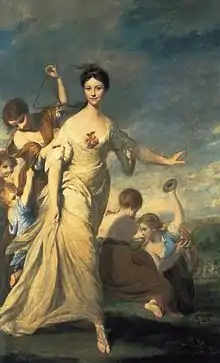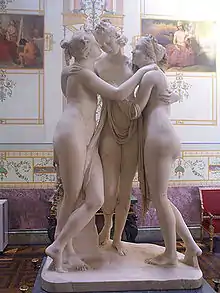Euphrosyne
Euphrosyne (/juːˈfrɒzɪniː/; Εὐφροσύνη), in ancient Greek religion and mythology, was one of the Charites, known in ancient Rome as the Gratiae (Graces). She was sometimes called Euthymia (Εὐθυμία) or Eutychia (Εὐτυχία).[1]
| Euphrosyne | |
|---|---|
Goddess of good cheer, joy and mirth | |
| Member of The Charites | |
 A statue of Euphrosyne in Achilleion palace, Corfu. | |
| Affiliation | Aphrodite |
| Major cult centre | Boeotia |
| Abode | Mount Olympus |
| Personal information | |
| Parents | Zeus and Eurynome |
| Siblings | Aglaea and Thalia |
Greek mythology
Euphrosyne is a Goddess of Good Cheer, Joy and Mirth.[2] Her name is the female version of a Greek word euphrosynos, which means "merriment".[3] The Greek poet Pindar states that these goddesses were created to fill the world with pleasant moments and good will.[4] Usually the Charites attended the goddess of beauty Aphrodite.[5]
According to Hesiod, Euphrosyne and her sisters Thalia and Aglaea were daughters of Zeus and the Oceanid Eurynome.[6] Alternative parentage may be Zeus and Eurydome, Eurymedousa, or Euanthe; Dionysus and Kronois; or Helios and the Naiad Aegle.[7][8][9]
In art, Euphrosyne is usually depicted with her sisters dancing.[2]
In art and literature
She is depicted with the other two Graces at the left of the painting in Botticelli's Primavera. The sculptor Antonio Canova made a well-known piece in white marble representing the three Graces, in several copies including one for John Russell, 6th Duke of Bedford.[10]
Joshua Reynolds painted Mrs. Mary Hale, wife of General John Hale, as Euphrosyne in 1766.

John Milton invoked her in the poem L'Allegro.[11]

Cults of Euphrosyne
Euphrosyne and her sisters' main cult was located in Athens, Sparta, or Boetia.[12][2]
In science
The asteroid 31 Euphrosyne is named after the goddess, as is the Euphrosinidae family of marine worms.
References
- Pindar, Fragment 155
- Larson, Jennifer (2007). Ancient Greek Cults. New York, NY: Routledge. pp. 162–163. ISBN 978-0415491020.
- "Theoi Greek Mythology & the Greek Gods". theoi.com. Retrieved 2016-08-30.
- Pindar, Olympian Ode 14, 1-20
- Homeric Hymn 5 to Aphrodite, 58
- Hesiod, Theogony, 907
- Cornutus, Compendium of Greek Theology, 15
- Nonnus, Dionysiaca, 15.87 & 48.530
- Pausanias, Description of Greece, 9.35.5
- The Three Graces. Victoria & Albert Museum, 2013. Retrieved 2 May 2013.
- "Milton, L'Allegro and Il Penseroso"
- "www.britannica.com". Retrieved 2016-08-31.